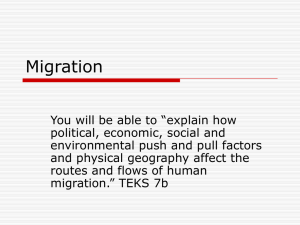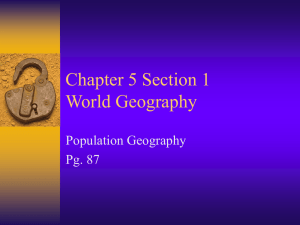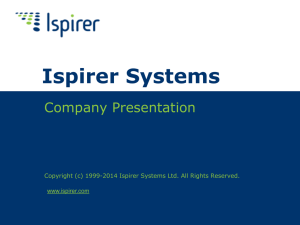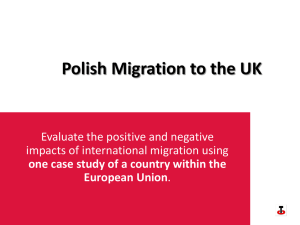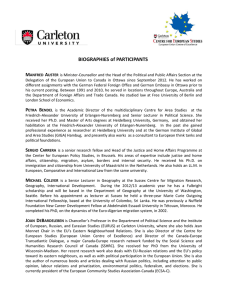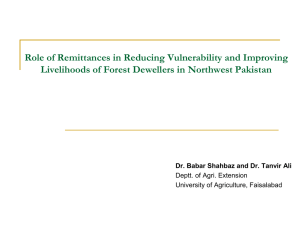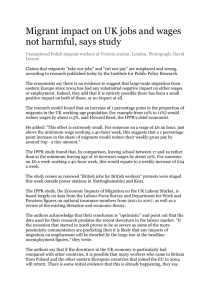Conference Papers - Princeton University
advertisement
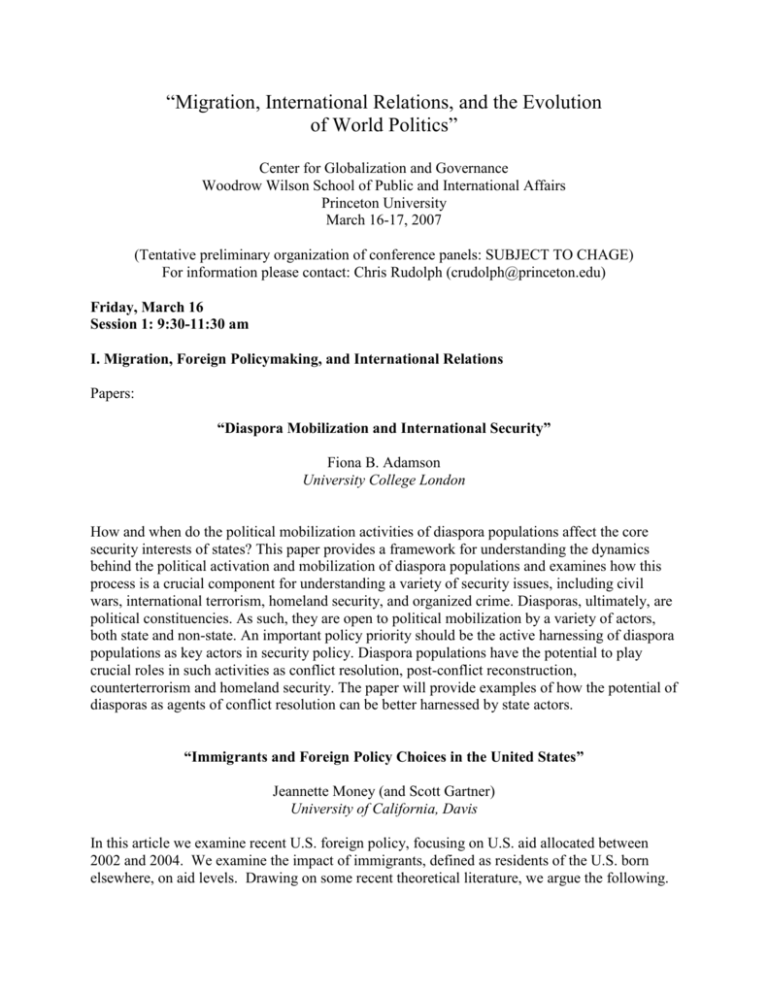
“Migration, International Relations, and the Evolution of World Politics” Center for Globalization and Governance Woodrow Wilson School of Public and International Affairs Princeton University March 16-17, 2007 (Tentative preliminary organization of conference panels: SUBJECT TO CHAGE) For information please contact: Chris Rudolph (crudolph@princeton.edu) Friday, March 16 Session 1: 9:30-11:30 am I. Migration, Foreign Policymaking, and International Relations Papers: “Diaspora Mobilization and International Security” Fiona B. Adamson University College London How and when do the political mobilization activities of diaspora populations affect the core security interests of states? This paper provides a framework for understanding the dynamics behind the political activation and mobilization of diaspora populations and examines how this process is a crucial component for understanding a variety of security issues, including civil wars, international terrorism, homeland security, and organized crime. Diasporas, ultimately, are political constituencies. As such, they are open to political mobilization by a variety of actors, both state and non-state. An important policy priority should be the active harnessing of diaspora populations as key actors in security policy. Diaspora populations have the potential to play crucial roles in such activities as conflict resolution, post-conflict reconstruction, counterterrorism and homeland security. The paper will provide examples of how the potential of diasporas as agents of conflict resolution can be better harnessed by state actors. “Immigrants and Foreign Policy Choices in the United States” Jeannette Money (and Scott Gartner) University of California, Davis In this article we examine recent U.S. foreign policy, focusing on U.S. aid allocated between 2002 and 2004. We examine the impact of immigrants, defined as residents of the U.S. born elsewhere, on aid levels. Drawing on some recent theoretical literature, we argue the following. First, immigrant preferences can be induced from their immigrant status. Refugees, because they have fled their country of origin due to some type of persecution, prefer an aggressive stance towards their former country (e.g. overthrowing the extant government). Economic migrants, on the other hand, leave because of the lack of economic opportunity and prefer a more cooperative stance (e.g. higher aid flows) that would induce economic growth and opportunities for return. Therefore, we can predict the policy preferences of migrants toward their home state based on the proportion of refugees in the migrant population. Second, in many ways, immigrants are just another societal group. This allows us to draw on a well developed literature on group political effectiveness. As a result, standard SES-based models of political activism can be used to determine the collective influence of immigrant groups on foreign policy. Third, immigrant and refugee flows, when informed by policy preference and political effectiveness, provide a critical addition to models predicting foreign policy behavior. To generate data on immigrant communities in the U.S., we employ data from the 1000 decennial census and from the INS. In our preliminary analyses, the evidence suggests that immigrants do affect aid levels, with aid levels decreasing as the proportion of refugees in the host country population increases and as the immigrants’ political power increases. Our results contribute to the literatures on the influence of immigrants on national policy and on the domestic determinants of foreign policy. “Diaspora Communities and Foreign Policy” Yossi Shain Georgetown University Session 2: 1:00—3:00pm II. Migration and the Evolution of World Politics Papers: “Territory, Authority, and Rights” Saskia Sassen Dept. of Sociology University of Chicago Where does the nation-state end and globalization begin? This paper shows how the national state made today's global era possible. I argue that even while globalization is best understood as "denationalization," it continues to be shaped, channeled, and enabled by institutions and networks originally developed with nations in mind, such as the rule of law and respect for private authority. This process of state making produced some of the capabilities enabling the global era. The difference is that these capabilities have become part of new organizing logics: actors other than nation-states deploy them for new purposes. I build my case by examining how three components of any society in any age--territory, authority, and rights--have changed in themselves and in their interrelationships across three major historical "assemblages": the medieval, the national, and the global. “Migration and the Transformation of World Politics” Martin O. Heisler University of Maryland, College Park Large-scale migrations are transforming both domestic affairs and world politics. The politicization of the presence of large numbers of “undigested,” and especially undocumented, migrants and their descendants has increased the salience of migration in the domestic politics of western democracies. Confrontations between opponents of further immigration and the continued presence of migrants (especially those who entered illegally), on the one hand, and advocates of immigration motivated by economic and human rights concerns, on the other, are becoming more common and virulent. While large-scale transnational migration over the past 30-40 years has made the control of economic, cultural and even physical borders difficult for sending states as well as for receiving the countries, virtually all scholarly attention has been focused on the latter. Irredentism by regime opponents; arms and money smuggling; collusion with governments or factions in the host society for regime change in the country of origin are some of the security threats that may emerge for sending states. Attempts to conceptualize, research and theorize the political and security problématiques of sending and receiving countries in a systemic, linked fashion are virtually non-existent. This paper moves toward filling two gaps in the literature. First, it considers the joint security problématiques of four regional migration systems, where security is viewed broadly, to include economic, societal and human security. These are (1) China and overseas Chinese; (2) Turkey, North Africa and the Western European EU states; (3) Central America (including Mexico) and the United States; and (4) the Republic of South Africa and southern Africa. Second, building on those four examples, it sketches the outlines of one possible view of a global international system viewed through the prism of both long- and short-term (i.e., refugee flows, temporary displacements) population movements. “Migration, Trade and the Political Economy of Development” James Hollifield Southern Methodist University Abstract: International trade is a well established determinant for income and growth. In addition to the classic gains from trade for all trading partners, international economic relations often provide access to technological know-how and thus give developing countries a chance to reduce the development gap at a faster pace. The impact of international migration on the welfare of both source and recipient countries is a more recent phenomenon. Recipient countries benefit, inter alia, from the availability of the immigrant workers, both skilled and unskilled. Source countries benefit, inter alia, from the remittances sent back home by migrant workers, an increasingly important source of foreign exchange in some developing countries. While international trade and migration are often looked at in isolation in terms of their impact on development, this paper looks at their individual as well as their joint role for growth and development, using evidence specifically from Mexico and the Philippines. The goals of the paper are to understand the historical relationship between migration, trade and development, and how states shape and control international migration for strategic gains. Session 3: 3:15—4:45pm III. Coordination and Collaboration in Migration Control Papers: “Interdependence and Migration: Towards Interstate Cooperation on Migration” Chris Rudolph Princeton University How does globalization affect the way that states respond to international migration? There is little doubt that various elements of globalization have served to facilitate the volume and diversity of international migration flows. The scope and scale of global migration has reached unprecedented heights. Accompanying this increase in flows has been an increasing politicization of the issue and demand for higher levels of state control, particularly in migrant receiving countries. Because of its links to sovereignty, policy responses have traditionally been unilateral; however, there is increasing realization that such measures are insufficient to reach desired levels of control and coordination. Over the past 25 years, we have begun to see a significant shift in this orientation, as states increasingly seek to coordinate their efforts through bi- and multilateral cooperation and coordination. I hypothesize that this growing “policy internationalism” is the product of 1) globalization and its effects, and 2) political learning and the resulting evolution of ideas regarding international migration and its economic, social, and political effects. “Providing Collective Security: International Cooperation and Unwanted Migration” Eiko Thielemann London School of Economics By its very nature, international migration affects the relationship between countries of origin and destination (host) countries. Large-scale migratory flows (in particular refugee flows) also affect the relations between destination countries, as unilateral policy responses by one state often produce significant externalities (both positive and negative) for other states. Resulting free-riding opportunities have frequently undermined cooperation and led to the underprovision of collective security measures aimed to control unwanted migratory flows. Such under-provision is widely recognized as a central problem of international governance in a variety of issue areas. But why do some states accept what appear to be disproportionate and inequitable burdens when providing collective security goods? Focusing on efforts by the UNHCR and the EU aimed at the collective management of irregular migrants and asylum seekers, the paper shows that analyzing collective migration management from an international public goods perspective offers new ways to assess the efficiency and equity of regional and global cooperation in this area. _______________________________ Saturday, March 17 Session 4: 9:00—11:00am IV. Refugee Flows and Security Papers: “Humanitarian Nightmares and Political Realities: The Role of Refugees in International Security” Sarah Kenyon Lischer Wake Forest University Current media reports on the conflict in the Darfur region of Sudan lament the dire humanitarian consequences of the war. Since the conflict began in early 2003, two million people have been displaced from their homes, hundreds of thousands have died from violence or war-related privation, and hundreds of villages have been destroyed. Reliance on traditional explanations of conflict obscures the central role of forced migration in Darfur and in many other wars. Studies of international security often consider forced migration as an unfortunate byproduct of conflict. The premeditated displacement in Darfur, and the security implications of the refugee crisis, offers clear evidence that forced migration is not a peripheral or purely humanitarian phenomenon. Despite the restraints of international law, refugee crises intrude upon the political and military realms in three important ways. First, refugees can affect conflict by exporting a war across international borders. Second, refugee populations can exacerbate violence by engaging in conflict with the receiving state. Third, refugee crises can also prolong an existing conflict when combatants use refugees as a recruitment pool, resource base, or propaganda tool. “Refugee Warriors and Political Violence against Host and Home Countries” Idean Salehyan University of North Texas Refugee communities underscore the frequent incongruence between two aspects of statehood: control over territory and political bonds between states and citizens. Refugees frequently maintain a home country political orientation, but are not physically present within the state's sovereign jurisdiction. Moreover, because of government persecution, bonds of loyalty and allegiance to the state are broken. On the other hand, refugees are physically present within the territorial jurisdiction of the state to which they fled, but are often unwilling or unable to integrate into the host polity. These incongruencies may lead to political violence by 'refugee warriors' against home and host countries. Violence against the home state is more likely when refugees are marginalized in their hosts and are allowed to mobilize opposition activities. Violence against the host state is likely when refugees are not integrated into the host polity and are also restricted in their opposition activities. Allowing refugees to integrate into the political and social life of the host offers the best prospects for limiting violence. "The Coercive Power of Not-So-Natural Disasters" Kelly M. Greenhill Wesleyan and Harvard Universities Long before September 11th galvanized a new preoccupation with border security, issues surrounding refugees and illegal migrants had in many countries transmuted from a matter of "low politics" to a matter of "high politics," involving a shift in the definition of national security threats and in the practice of security policy. While our understanding of the consequences of such anxieties is relatively well developed, such is not the case with respect to their causes. Assessments within recipient states of the causes of migration crises have tended to privilege transparent, individual-level "pull factors" that drive migration, such as the search for a better socio-economic future over less obvious, yet also critically important, state and group-level "push factors," such as the desire to influence policy within potential receiving states. Using combination of large-N data and comparative case study analysis, this paper offers a new look at the underappreciated role of push factors in the creation and escalation of migration crises and, in particular, the role of attempted coercion in catalyzing and exacerbating crises. Specifically, the paper presents—and offers a plausibility probe of—a new theory to explain how and under what conditions states' material fears of massive inflows may come into conflict with their normative commitments to the protection of the displaced, and do so in ways that facilitate successful coercion of the strong by the relatively weak. This kind of coercion does not always succeed. Still, for reasons this paper will make clear, it succeeds with greater frequency than traditional IR theory would predict, given the power and capabilities asymmetries that tend to exist between coercers and their targets. Session 5: 11:15am—12:45pm V. Non-State Actors and International Migration Papers: “Migration, Security, and the Rise of Non-State Actors: A Case Study of the International Aviation Security ‘System’” Gallya Lahav State University of New York-Stony Brook The linkage between security and migration concerns has coincided with the proliferation and incorporation of non-state actors, who have the economic, political, and technological resources to facilitate or curtail travel, migration and return (see Lahav, 1998; 2003). Actors such as airlines and transport companies, travel agencies, hospitals, universities, employer groups and foreign states have been co-opted in an extended regulatory framework of migration and border control. In the literature, they have invariably been understood as ‘deputy sheriffs’ (Torpey 2004), ‘agents’ (Guiraudon and Lahav, 2000) and public-private partnerships (Lahav, 2006) in processes of ‘remote control’ (Zolberg, 1999), delegation (Guiraudon and Lahav, 2000; Guiraudon, 2003), externalization (Lavenex and Ucarer, 2005; Boswell, 2003), outsourcing, and privatization (Lahav, 1998; 2000, 2005). In all cases, the development of the relationship between states and non-state actors in meeting security and mobility goals captures a global era marked by both a political desire to control movement, and agents willing and able to play on the link between mobility and security. The question is to what extent do these actors open up new channels and opportunities for state regulation over borders, or represent a transformation and abdication of state sovereignty and diminished democratic governance? To a large degree, the answers depend on the nature of the relationships that keep these dynamics in motion, and the degree of collaboration, cooptation or level of autonomy of each actor. In this paper, I focus on the case of the aviation security system to highlight the relationship between private and public actors in managing border control. By providing a disaggregated view of the aviation ‘system,’ this paper examines the nature of an extended regulatory field that includes both central state and non-state actors in border security and regulation. I consider the implications for effective border management and civil liberties, as well as broader issues of state sovereignty and democratic governance. “Discussing International Migration in Global Policy Circles” Colleen Thouez and Sarah Rosengärtner United Nations Institute for Training and Research Abstract: This paper explores the central elements characterizing the discourse on migration within the principal arena for international discourse—the United Nations. These elements include: 1) the focus on its relationship with development (rather than, and excluding other possible inter-linkages such as security); 2) the North/South dynamic (often focused on the rift between view points and interests); 3) greater in-roads at the regional level (rather than international) on formal collaboration; 4) few internationally binding migration-related agreements; and 5) tepid advances towards formalizing international discourse. This part of the paper will explain each of these characteristics, focusing on the history of the debate at the United Nations and on recent developments. The second part of the paper examines these elements through the lens of supporting concepts in IR theory. It analyzes the extent to which such concepts assist us in our understanding and contribute prescriptive value for the future. For instance, first, the centrality of the migration and development nexus as the basis for discussions at the UN: to what extent does the migrant as rational actor become the primary agent for determining migration trends? Second, the North/South tension: trade-offs on migration are often touted as based on mutual benefits but is migration inherently a “0-sum” game for states? Third, regional in-roads: why are states seemingly more prepared to constrain sovereignty for formal regional agreements than for international ones? Fourth, the dearth of international instruments: why do so few internationally binding agreements exist in this field, one considered of secondary importance not so long ago, compared with the multitude of treaties in parallel fields such as the environment? And, fifth, steering the policy discourse agenda: who are the big players influencing progress or encouraging constraint?
